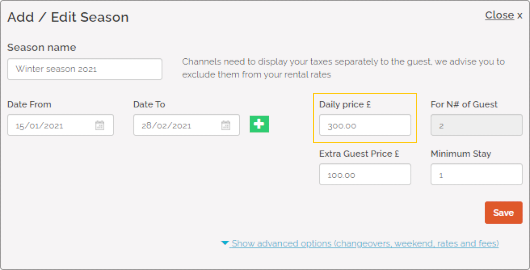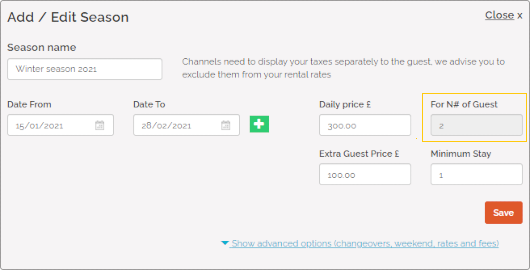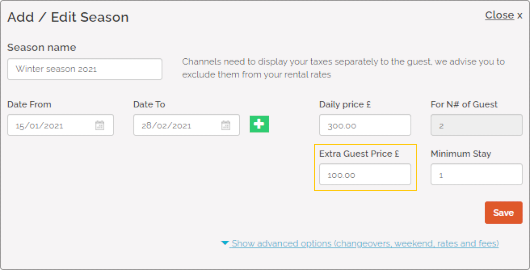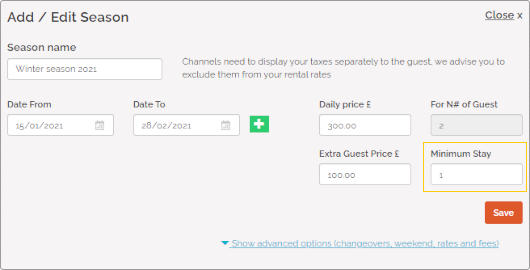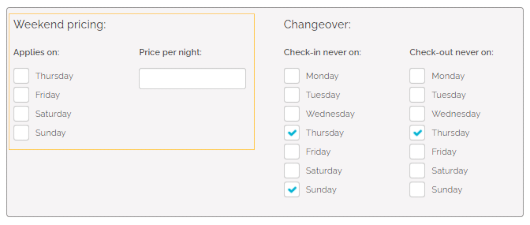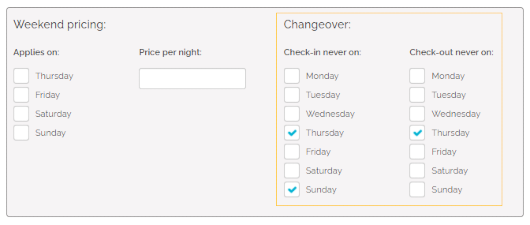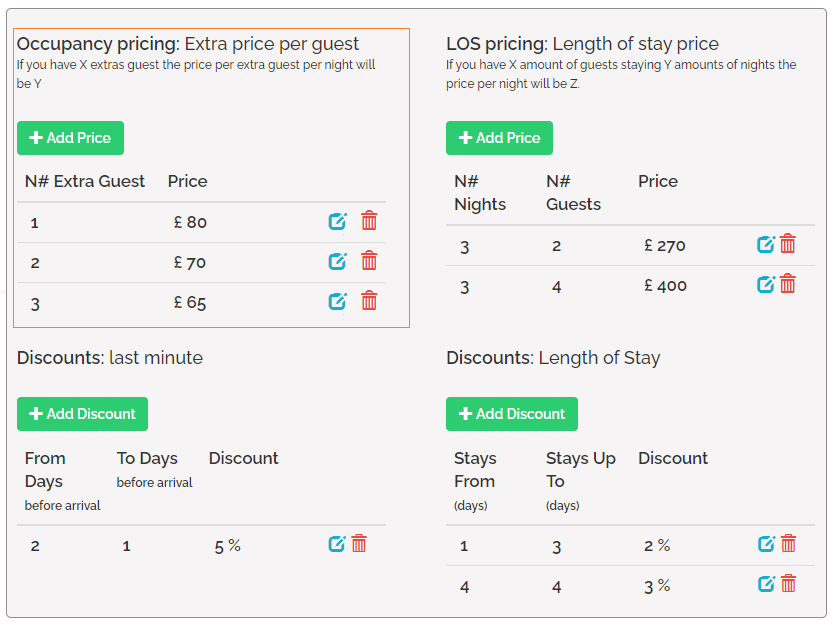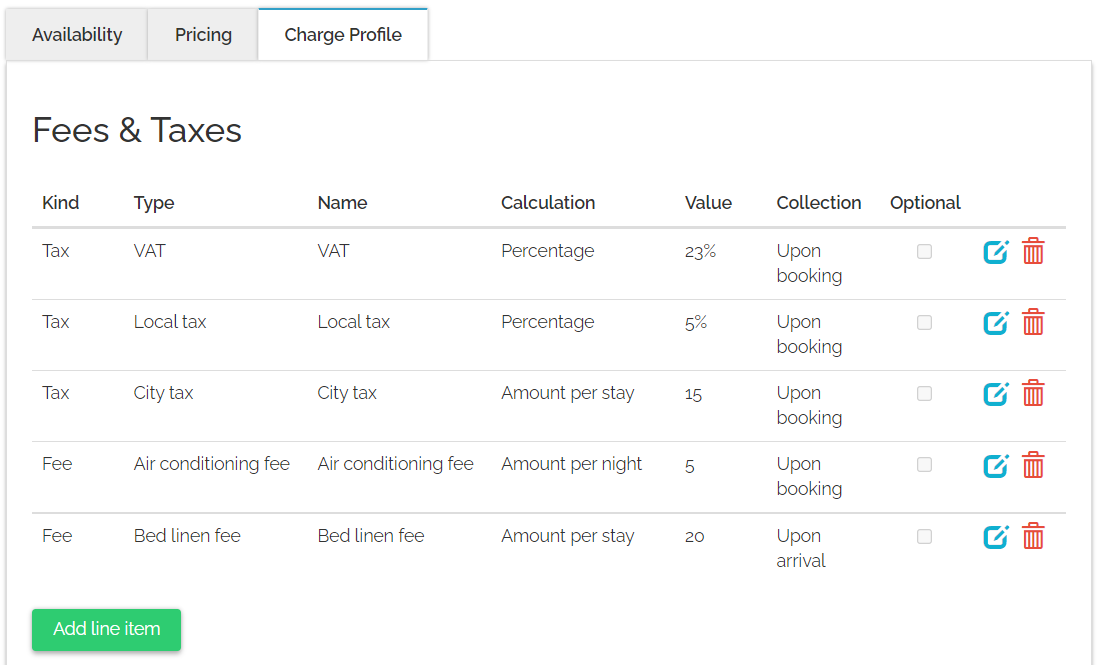Step 5: Price and availability
LOS pricing model
Trip.com supports LOS pricing. If you use LOS pricing model, it will be fully sent to Trip.com.
FSP pricing model
Trip.com supports FSP pricing. If you use FSP pricing model, it will be fully sent to Trip.com.
Daily price model
Daily price

Daily price is the standard way of setting prices. It indicates the base price per night for the Standard number of guests.
Note that the Daily price value which is eventually available for the potential guest depends on the data introduced in the following fields:
-
Standard number of guests,
-
Extra guest price,
-
Weekend pricing.
Standard number of guests

Standard number of guests refers to the maximum number of guests included in the Daily price for whom the price does not change. If more guests than specified book a stay, the extra guests will be charged with the price set in the Extra guest price element.
Extra guest price

Extra guest price is the price for guests that are not included in the Standard number of guests. In other words, if the overall number of guests exceeds the Standard number of guests, Extra guest price is applied for each guest above the specified standard.
Minimum stay

Minimum stay indicates the minimum number of days a reservation can be made for. Guests will be not be able to book your property if they want to book stays shorter than minim stay. This value is mandatory to provide.
Trip.com accepts Minimum stay and displays it for the guests. Note, however, it is not possible to book a stay longer than 28 nights.
Weekend pricing

Weekend pricing refers to a specific type of pricing rules that are applied on selected weekend days only. If the weekend-specific pricing is set and the reservation matches specified criteria, then the Weekend pricing will be applied instead of the Daily price.
Changeover restrictions

Changeover restrictions specify whether check-in or check-out is allowed for a given day. This is a great option if you need the guests checking in and out to fit your schedule and it will help you avoid unexpected guests. If some days are restricted from changeovers, then your guests will simply not be able to select such a stay if the start or end day falls on a changeover-restricted day. If some days are set not to allow guests to Check-in or Check-out, then this information is pushed in the ARI data. Any booking that has a changeover selected for the blocked days will be rejected.
Occupancy pricing

In Occupancy pricing, it is possible to specify pricing plans for different numbers of guests. The difference between Extra guest price and Occupancy pricing lies in fact that with Extra guest price the same price is applied for each extra guest. On the other hand, in Occupancy pricing it is perfectly possible to specify different prices for different numbers of guests. Note that Occupancy pricing takes precedence over Extra guest price.
Complimentary topics
Discounts (N/A)
Instead, it is recommended to use the Step 5: Price and availability.
Calendar
Calendar stands for the property's availability to rent. You can check here the availability of your property in the selected time frames. Once a reservation is inserted in Rentals United, the availability in the calendar gets blocked for this period. The calendar is updated automatically every time the availability of the property changes or at predefined times to remain up-to-date. For Trip.com, the availability is sent upon change.
Preparation Time Before Arrival
PTBA stands for Preparation Time Before Arrival. It is a general keyword to describe the minimum time a booking has to be made in advance in order to be accepted by the PM. The dates restricted by PTBA are normally set as not available already in the calendar. Hence, the PTBA data is already applied in availability and sent to the channel within the ARI data. The PTBA in Rentals United blocks the availability x hours from 23:59 of the day of arrival on the property's local timezone. For example if the PTBA is set to 6 hours, bookings will be accepted until 18:00 of the day of arrival, after 18:00 the calendar will be closed. If the PTBA is set to 24 hours, bookings will be accepted until 23:59 before the day of arrival, after that the calendar will be closed.
In case of Trip.com, the PTBA-blocked period is already shared with the channel within the property's calendar. Hence, the time restricted by PTBA are set to unavailable to book.
For detailed description of how PTBA works, please see the chapter in Rentals United: User Guide.
Tax

Tax refers to mandatory charges legally levied on particular types of goods, services and transactions, paid as a contribution to the state’s revenue, for example VAT or city tax.
After being reviewed, taxes are mapped between Rentals United and Trip.com. Please, see the below list for details of the taxes mapping:
| Rentals United tax type | Trip.com mapping |
|---|---|
| City tax | City tax |
| Goods and services tax | Goods & services tax |
| Local tax | Local council tax |
| Tourist tax | Tourism tax |
| Unknown | Not mapped |
| VAT | VAT |
Trip.com uses specific Tax requirements, which are part of Connecting to Trip.com.
Fee

Fee refers to mandatory or optional charges paid in exchange for particular services. These include:Charges for additional services, for example Internet access or shuttle.
Fees defined by local governments that do not fall into the tax category, for example environmental fees.
Trip.com treats both Rentals United fees and taxes as taxes on its side. Hence, only the mandatory fees are mapped. Please, see the below list for details of the charges mapping.
| Rentals United fee type | Trip.com mapping |
|---|---|
| Air conditioning fee | Air conditioning fee |
| Airport shuttle fee | Transfer |
| Bed linen fee | Bed linen fee |
| Booking fee | Not mapped |
| Club card fee | Not mapped |
| Conservation fee | Conservation fee |
| Credit card fee | Not mapped |
| Electricity fee | Electricity fee |
| Gas fee | Gas fee |
| Heating fee | Heating fee |
| Housekeeping fee | House-keeping fee |
| Insurance | Not mapped |
| Internet fee | Not mapped |
| Kitchen linen fee | Kitchen linen fee |
| Linen package fee | Linen package fee |
| Oil fee | Oil fee |
| Parking fee | Not mapped |
| Pet fee | Pet fee |
| Resort fee | Resort fee |
| Sea plane fee | Transfer |
| Service fee | Service charge |
| Shuttle boat fee | Transfer |
| Ski pass | Not mapped |
| Tourism fee | Tourism fee |
| Towels fee | Towel charge |
| Transfer fee | Transfer |
| Unknown | Not mapped |
| Visa support fee | Visa Support fee |
| Water park fee | Not mapped |
| Water usage fee | Water usage fee |
| Wood fee | Wood fee |
| Wristband fee | Not mapped |
Trip.com does not accept charges marked as Unknown or Other. If your property uses such charges, it may cause inconsistency in your pricing. The charges should be mapped in a proper way, so that Trip.com receives correct pricing information and correctly displays pricing for guests. Note also that some charges can be covered in other settings.
Example: Credit Card Fee is not mapped for Trip.com. In case such a fee is charged, it is recommended to adjust the markup in the Property Settings page in order to cover for it.Note: In case a particular charge is not mapped, the PM should report it to Trip.com and request to add it manually.If more charges are mapped to a single Trip.com charge type, they all have to use the same calculation logic in order to be calculated correctly. In case each charge is calculated in a different way, then a notification is presented:
This charge is not mapped correctly in Rentals United. Please map it to the correct fee/tax type or file a support ticket to get help on this.
Example: Transfer fee is calculated as a percentage of the total price. Airport shuttle is a fixed amount per whole stay. These two fees are mapped to Transfer in Trip.com. In such a case, mapping will not be performed correctly and the notification will be displayed. To fix this, unify the calculation logic for the mentioned charges, so that both are calculated in the same way.Collection time (upon booking / upon arrival) is supported by Trip.com
In case you are a PMS user, ensure that all taxes have properly defined names and there are no unnamed taxes. Otherwise, they will not be handled properly.
Down payment (N/A)
Security deposit (N/A)
Currency
Currency in Rentals United is a fixed value, by default established on the basis of the property location. The currency of any property can be checked in Rentals United, go to Step 5: Price and availability after selecting All properties tab.
However, for Trip.com, the property currency is adjusted to reflect the currency applicable in a country the property is located in.
